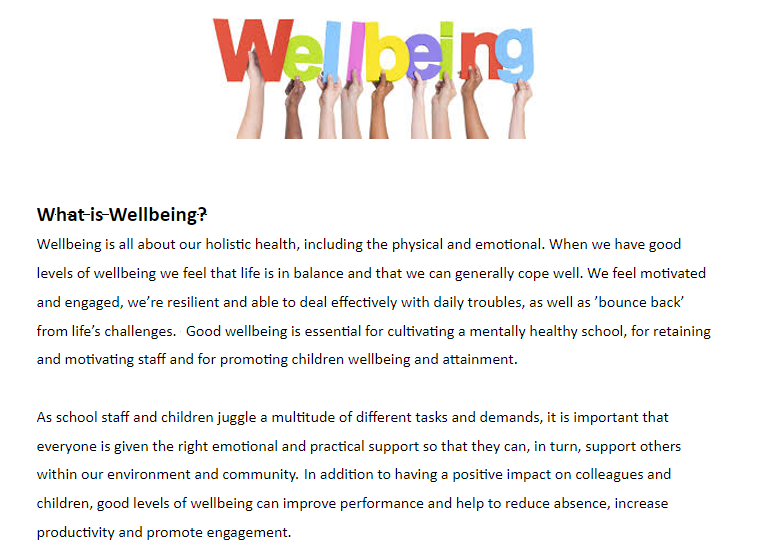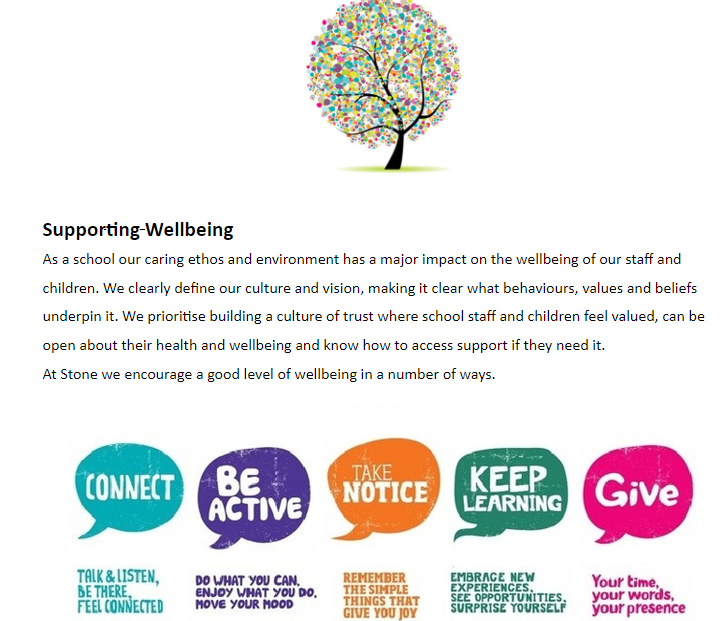Supporting Mental Health and Wellbeing at
Cawston Grange Primary School
Please speak to your child’s class teacher if you have any concerns about their Wellbeing or Mental Health.
This document explains some of the ways that we can support your child in school. It also lists the key people who may be involved if you or the school have any concerns.
Key Questions to Consider When Discussing Wellness with your Child
1. What five words do you think best describe you?
This question points children in the direction where they know themselves and have an idea of what other people think of them. It gives your child a good frame of reference on where she stands in her small world, which is important for moulding the right self-image.
2. What do you love doing that makes you feel happiest?
Some children will say playing video games makes them feel happiest, which is actually fine. Recent studies show that there are actually many psychological benefits of gaming. Gaming even brings spouses closer together if they participate together.
The point of this question is to direct your child’s attention to the things that makes him feel happy and open his eyes to the fact that he can actively choose to increase time spent in those activities that bring him joy. Hopefully, this will teach him to pursue activities, hobbies and even careers that make him happiest later on in life.
3. What do you know how to do that you can teach others?
This question is about teaching kids that life is not all about you, your own interests and what you can get from others. Life is about us all and what we can do to help each other.
The question helps your child feel empowered and valued. It reminds her that she is special and she has something to offer. When your child feels special and knows she has something to offer, it builds self-confidence and self-worth, and also encourages learning.
4. What is the most wonderful/worst thing that ever happened to you?
Life is not all sunshine and rainbows, but neither is it all gloom and doom. Life is a mix of good and bad experiences, and that’s what makes it so exciting.
Kids need to understand this fact early so they are mentally prepared for life. The question is about directing that awareness. It helps your child realize (from her own experience) that bad things don’t last forever.
The sun always shines after the storm, and the sunshine feels good. You also gain valuable insight into areas you can help your child get past.
5. What did you learn from the best/worst thing that’s happened to you?
An old adage says experience is the best teacher, which is true. It is important that kids extract lessons from their own experiences (both good and bad) and also from the experiences of others, including their parents.
6. Of all the things you are learning, what do you think will be the most useful when you are an adult?
This question is about reminding children that they will be adults one day and that they need to start living purposely. It is also about sensitizing your kids to where their conscience is calling them and what they should be doing right now to get there.
When your child understands the value of what he is learning and how it can help him in the future, it can motivate him to truly enjoy things like reading, studying and learning.
7. If you could travel back in time three years and visit your younger self, what advice would you give yourself?
This question can make for a fun conversation that helps you learn about (and address) past issues that hurt your child, in addition to instilling in them the habit of learning from their mistakes. The question opens up exciting avenues to talk to your kids about how to deal with disappointments and frustrations in life, while also teaching them the meaning of the expression, “making lemonade out of lemons.”
8. What are you most grateful for?
This question encourages kids to count their blessings and look at the brighter side of life. It is about teaching kids to put things into perspective, look around and appreciate what they have in life no matter how small, including family, friends, a good school and food.
This, is turn, can contribute to your child’s overall happiness, as there is a strong correlation between gratitude and happiness.
9. What do you think that person feels?
It’s easy for kids to focus solely on their own feelings and neglect to consider what other people feel. However, to build stronger relationships and avoid unnecessary conflicts in life, it is important for your child to consider what other people feel and show empathy.
Help her to develop empathy by asking her to wonder about what someone else feels. Your child will become a more compassionate, helpful and happy person just by being more considerate and empathetic. She will lead a richer, fuller life of meaning by thinking of (and often helping) others.
10. What do you think your life will be like in the future?
This question also directs children to think about the future and plan for it. It will help your child to ponder on what he wants to be when he grows up and how he’d like the world to be like when he’s older.
You will in turn discover what your child is moving toward and see how you can help him realize that dream from the conversation you have around this question.
We offer different levels of support:
Universal Support
To meet the needs of all our pupils through our overall ethos and our wider curriculum.
Additional Support
For those who may have short term needs or may be vulnerable due to life experiences such as bereavement.
Targeted Support
For pupils who need more personalised support or specific therapeutic interventions.


